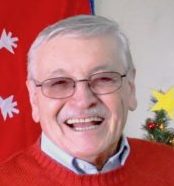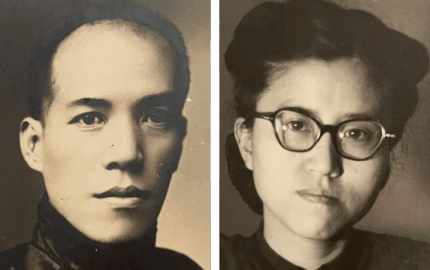Tim Giago, an Oglala Lakota journalist, newspaper pioneer and 1991 Nieman Fellow, died in Rapid City, South Dakota, on July 24, 2022, at the age of 88.
In 1981, Giago founded the Lakota Times (later renamed Indian Country Today), the first independently owned Native American weekly in the United States. He later founded other newspapers including the Lakota Journal and the Native Sun News.
Giago helped launch the Native American Press Association (now called the Native American Journalists Association or NAJA) in 1983 and served as the group’s first president. In 1994, he was selected for the South Dakota Hall of Fame and in 2007, he became the first Native American to be inducted into the South Dakota Newspaper Hall of Fame. His other honors include the 1985 H. L. Mencken Award for editorial writing and the 2017 NAJA-Medill Milestone Achievement Award for his lifetime of service to journalism and dedication to NAJA.
Throughout his career, he mentored and trained other Native journalists and worked tirelessly to promote and support a free press in Indigenous communities.
As a boy, he attended the Holy Rosary Indian Mission School (now named the Red Cloud Indian School) on the Pine Ridge Reservation, where he was born and raised. He wrote about his experiences in his book “Children Left Behind: The Dark Legacy of Indian Mission Boarding Schools,” which tells the story of the widespread abuse suffered by the children in the schools run by the Catholic Church and the attempted destruction of Lakota culture, religion and traditions. The book was illustrated by his daughter Denise Giago.
In 1952, Giago joined the Navy and went to college on the GI Bill, attending the University of Nevada, Reno. Reflecting on his life and career, he explained that he received his Lakota name, Nanwica Kciji — He Stands Up for Them — in an inipi (sweat lodge) ceremony celebrating his safe return from service in Korea.
His weekly column, “Notes from Indian Country,” was syndicated by Knight Ridder and appeared in newspapers across the U.S.
An Independent Voice in the Community
In 2005, Giago wrote in Nieman Reports about freedom of the press in Indian Country and what drove him to start The Lakota Times: “While working as a reporter for The Rapid City Journal, I was bothered by the fact that although I had been born and raised on the nearby Pine Ridge Indian Reservation, I was seldom given the opportunity to do news stories about the people of that reservation. One editor told me he believed that since I was Native American, I would not be able to be objective in my reporting. I replied, “All of your other reporters are white. Are they objective when covering the white community?”
Giago didn’t shy away from addressing difficult topics, sometimes publishing opinions that risked his own safety. He explained in Nieman Reports:
“Although our newspaper was located in Pine Ridge Village in the heart of the reservation, our hard-earned economic independence gave us the freedom we needed to report news as we saw fit and to write editorials critical of the tribal government, if the need arose. We also took a strong position against the violence perpetuated by AIM (the American Indian Movement). Several murders and brutal beatings had taken place on the reservation since the occupation of Wounded Knee, and AIM members, many of them from tribes outside of our reservation, were causing problems the tribal government was trying to stem.
“After I wrote a strong editorial in the fall of 1981, the windows of our newspaper office were blasted out with gunfire. We came right back with another editorial challenging the “cowards who strike in the middle of the night.” Two days before Christmas of that year firebombs were smashed against our building, which was saved when an alert Oglala Sioux Tribe police officer spotted the blaze and quickly kicked the burning bottles filled with gasoline away from the building.
“It was pretty clear by now that bringing freedom of the press to Indian Country was not going to be easy. But we continued to publish every week, and we continued to strike out at violence and injustice.”
In 1990, South Dakota eliminated Columbus Day and created Native American Day (the first state to do so) after Giago advocated for the change in the Lakota Times and called for a “Year of Reconciliation” in editorials directed at Gov. George Mickelson.
He told Nieman Reports that his proudest accomplishment was bringing more Native Americans into journalism: “My lasting legacy would be the dozens of young Indian journalists I sent out into the mainstream media in both newspapers and radio.”
Additional reading
Freedom of the Press in Indian Country (Nieman Reports, Fall 2005)
At its creation, the Lakota Times ‘became the only independently owned Indian weekly publication in America.’
By Tim Giago
Respecting Cultural Traditions in a Newsroom (Nieman Reports, June 15, 2005)
At the Lakota Times, editors help reporters blend their language and ceremonies into their work.
By Tim Giago
Tim Giago, NF ’91, on “The Missions of California: A Legacy of Genocide” (Nieman Reports, Summer-Fall 2018: Nieman Fellows comment on exemplary journalism that influenced them.)
Tim Giago reflects on his Nieman year (Nieman Reports, Summer-Fall 2013)
‘Don’t be afraid to stand up,’ the legacy of Tim Giago (Indian Country Today)
The Oglala Lakota journalist ‘has been a champion of free press in Indigenous communities his entire career and faced challenges, threats and political pressure, but always pushed to bring essential news and information to the people’
By Jourdan Bennett-Begaye and Mary Annette Pember
Memories: Tim Giago ‘made us all better’ (Indian Country Today)
Legendary Native American newsman Tim Giago on ending his historic career while celebrating a birthday (The South Dakota Standard)
An era of shame: The Indian boarding schools’ unholy impact on thousands of Native children (The South Dakota Standard)
By Tim Giago



